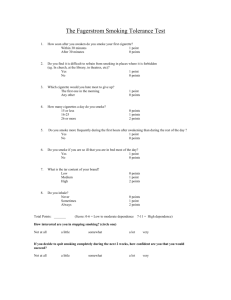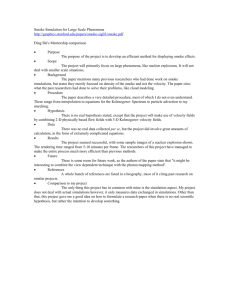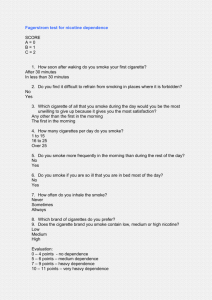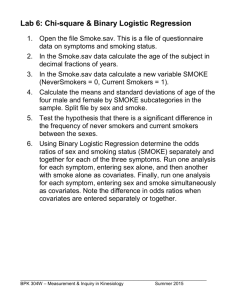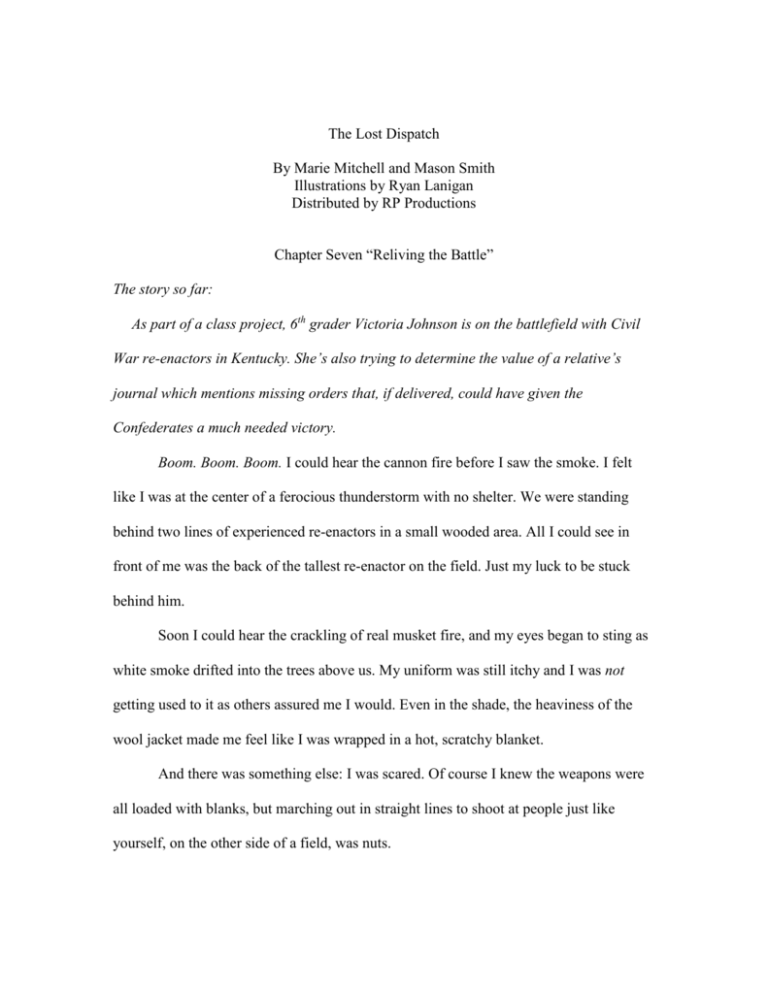
The Lost Dispatch
By Marie Mitchell and Mason Smith
Illustrations by Ryan Lanigan
Distributed by RP Productions
Chapter Seven “Reliving the Battle”
The story so far:
As part of a class project, 6th grader Victoria Johnson is on the battlefield with Civil
War re-enactors in Kentucky. She’s also trying to determine the value of a relative’s
journal which mentions missing orders that, if delivered, could have given the
Confederates a much needed victory.
Boom. Boom. Boom. I could hear the cannon fire before I saw the smoke. I felt
like I was at the center of a ferocious thunderstorm with no shelter. We were standing
behind two lines of experienced re-enactors in a small wooded area. All I could see in
front of me was the back of the tallest re-enactor on the field. Just my luck to be stuck
behind him.
Soon I could hear the crackling of real musket fire, and my eyes began to sting as
white smoke drifted into the trees above us. My uniform was still itchy and I was not
getting used to it as others assured me I would. Even in the shade, the heaviness of the
wool jacket made me feel like I was wrapped in a hot, scratchy blanket.
And there was something else: I was scared. Of course I knew the weapons were
all loaded with blanks, but marching out in straight lines to shoot at people just like
yourself, on the other side of a field, was nuts.
Part of my discomfort was the wait. We’d done a lot of that this weekend already.
Finally we heard shouting, and the orders made their way down the line to us. “Column
forward!” our re-enactor guide commanded. That’s not the direction I really wanted to
go, knowing what was waiting there. But off we marched, holding our wooden muskets
to the front in the most threatening manner we could muster.
I could tell we were climbing a hill once we left the trees. But because of the
troops in front of me, and the smoke, I could see little else. Beside me, Latisha was
walking stiff-legged, clinging to her musket like a lifeline. Not her usual self-assured
posture. She was obviously scared too. I’ll bet none of the books she’d consumed had
prepared her to face battle by actually walking in a soldier’s ill-fitting boots.
“Column halt!” Our lieutenant echoed the command that was passed down from
the front line. No argument from me on that one. I was happy to stay as far from the
fighting as possible. But it would be short-lived relief. I could hear the battle coming to
us. The musket fire sounded like a Chinese New Year parade marching up the street.
“Dress column!” came the next command. My line of ragged soldiers straightened
itself, and our front line knelt down and prepared their muskets to fire. For the first time, I
could actually see in front of me. Less than 50 yards away, a triple line of troops in gray
and brown were also kneeling and preparing their weapons. Artificial thunder, and clouds
of white smoke, swept over the field – erupting from nearby cannon.
“Fire!”
The line ahead of me was engulfed in flames and smoke as the re-enactors fired
their weapons. I held my wooden musket to my shoulder as if I could actually defend
myself with it. We heard another crash of musketry ahead of us. My view slowly cleared
as the breeze blew the smoke to the rear.
To my horror, I saw the entire front line of re-enactors lying face down in the
grass. Apparently they’d all been hit. We were now standing facing several lines of
enemy soldiers who were running toward us, screaming at the top of their lungs. A
modern-day Rebel yell. I had goose bumps on my goose bumps.
I didn’t need an order to know that this was our cue to break and run in the
opposite direction. In an instant I’d broken from the line and started an Olympicqualifying dash down the hill and into the woods. I didn’t even look to see if the
Confederates were following me. My heart was beating so fast I could hardly breathe. In
a daze, I soon found myself back in camp with a collection of other glassy-eyed, weakkneed, weekend soldiers. Some were without hats and weapons. I was still gripping mine
like the safety bar of a roller coaster. And my kepi was still perched on my head. At least
I was a well-dressed coward.
I saw Latisha wandering aimlessly around the campsite. Even here, smoke wafted
in among the trees and tents. “Latisha, are you okay?” I asked. She had trouble focusing
her eyes. “Yeah, I’m all right,” she responded hoarsely. “We ran away …”
I could feel my heart rate coming down. “It’s what we were supposed to do,” I
consoled her. “We can’t all be heroes. I hope it looked realistic to the crowd.”
“It looked realistic to me,” Latisha said. “In fact, too realistic.”
We decided to seek refuge in our tent for a while. I ducked under the flap and
reached for my haversack to check on Cora Lee’s journal.
The journal wasn’t there.
“Where is it?” I muttered out loud, searching the ground in case it had fallen out.
“Where is what?” Latisha asked.
I frantically started emptying the contents of the haversack onto the dirt floor of
the tent. “It’s got to be here,” I tried to reassure myself.
“You’re starting to scare me,” Latisha said, probably recognizing symptoms of
post-traumatic stress disorder.
“My journal. It’s missing,” I said incoherently.
“You brought your diary to the battlefield?” Latisha wondered.
I quickly sketched in the details of Cora Lee’s role in the Perryville Battle and the
importance of the missing dispatch.
Latisha’s battle panic had completely worn off now. I noticed that look in her eye.
I’d seen it before: just as she nailed the deciding question on the Academic Team tryouts.
“So who exactly knew the value of that journal?” she asked like a TV detective. “No one
would steal an old tattered book unless they knew what was in it.”
She had a point. Who did have motive and opportunity, I wondered? I started to
mentally list our suspects.
“I told the Courier reporter, M.K. Turney,” I reluctantly recalled. I hated to finger
someone who seemed so helpful.
“Girl, you need to watch more cop shows,” Latisha admonished. “It’s never the
obvious suspect. It’s usually somebody lurking in the background.”
But real world criminals aren’t always masterminds who meticulously plot out
their dastardly deeds. Sometimes they’re regular people who jump into crime without
thinking about consequences.
“I did ask M.K. to tell our teacher, Mr. Harvey, and the Civil War collector, Mr.
Forrest,” I said, still hoping to prove M.K. innocent. “Let’s see if she’s talked to them
yet.”
©2006 RP Productions, Inc. All rights reserved.


